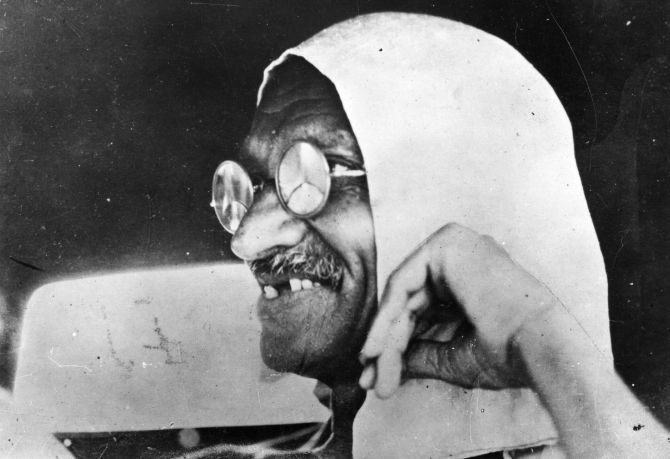'If we can award Madan Mohan Malaviya who died in 1946, then why not the Mahatma who died in 1948?'
'Why not go a little further back in time and give the award to Rabindranath Tagore who died in 1941?'
'And should we mark Lokmanya Tilak's 100th death anniversary in 2020 by giving him a Bharat Ratna,' asks Amberish K Diwanji.
 The Narendra Modi government has decided to confer the Bharat Ratna, India's highest award, on Atal Bihari Vajpayee, former prime minister and the stalwart Bharatiya Janata Party leader; and posthumously on Madan Mohan Malaviya, an educationist and politician of yore.
The Narendra Modi government has decided to confer the Bharat Ratna, India's highest award, on Atal Bihari Vajpayee, former prime minister and the stalwart Bharatiya Janata Party leader; and posthumously on Madan Mohan Malaviya, an educationist and politician of yore.
The award to Malaviya doesn't make sense. First, Malaviya was conferred the award on the eve of his 153rd birth anniversary, and 68 years after he expired in 1946.
This difference of over two generations between a person's demise and winning an award like the Bharat Ratna sets a dangerous precedent. Will someone be given an award 100 years after his death?
Second, and this applies to Malaviya, is that the Bharat Ratna is being conferred on people who were not even alive when this award was first instituted in January 1954.
The first Bharat Ratna to be conferred posthumously was on former prime minister Lal Bahadur Shastri, shortly after he died in January 1966. An award given soon after a person's death has a sense of immediacy.
The memories are fresh, the sentiments are strong, and the conferring an award is lauded by one and all. That is not so when awards are conferred decades later.
This trend of conferring the Bharat Ratna on our great leaders of the past began in 1990 when the then V P Singh government awarded Dr B R Ambedkar 34 years after his death.
Then, in 1991, the then P V Narasimha Rao government conferred the award on Sardar Vallabhbhai Patel, 41 years after the Sardar had passed into the ages.
A year later, the Rao government also sought to confer the Bharat Ratna on Netaji Subhas Chandra Bose, who had presumably expired on August 18, 1945. However, since Bose's death was never officially confirmed (decades later, many people steadfastly held on to the belief Netaji is still alive), this conferment had to be cancelled.
Awarding Dr Ambedkar 34 years after his death and Sardar Patel 41 years later (and seeking to award Netaji 46 years after his presumed demise) seemed political choices.
in Dr Ambedkar's case, one can argue that he was eligible because he was alive when the Bharat Ratna was first instituted. Sardar Patel and Malaviya were not even around. How can they be given awards that didn't exist in their lifetimes? Can anyone be given an award set up years later?
If we can award a person who died in 1946 (Malaviya) then why not the Mahatma who died in 1948?
Why not go a little further back in time and give the award to Rabindranath Tagore who died in 1941?
And should we mark Lokmanya Tilak's 100th death anniversary in 2020 by giving him a Bharat Ratna (how far apart are 68 years and 100 years)?
There has to be a limit to going back in time in conferring awards. The best such limit is the year the award was instituted. That is precisely why the Nobel Prize is not given to scientists like Charles Darwin or Antoine Lavoisier or Isaac Newton. It is the reason we do not award the Param Vir Chakra to the Rani of Jhansi or Mangal Pandey.
The greatest men and women are immortal because of their work, not because of some award given to them. In fact, the Bharat Ratna has been given to so many people that it holds limited value today.
In the years to come, few will remember that Dr Ambedkar or Sardar Patel were given the Bharat Ratna. But no one will forget what they did for Indians and India.
Conferring the Bharat Ratna on Vajpayee is fine, but the Modi government should have found another way of honouring Malaviya. You cannot award a Bharat Ratna to someone who died eight years before the award was set up. Rao erred in 1991, Modi has compounded the mistake in 2014.
Finally, before the Lok Sabha election in May 2014, Modi attacked Jawaharlal Nehru, Indira Gandhi and Rajiv Gandhi for not conferring the Bharat Ratna on Sardar Patel, seeing it as the vindictiveness of the Nehru-Gandhi dynasty.
Modi noted that Nehru and Indira Gandhi had conferred the award on themselves when they were prime minister (the Chandra Shekhar government, supported by the Congress party, conferred the award on Rajiv Gandhi posthumously).
But as we can now see, Nehru, Indira Gandhi and Rajiv Gandhi were not petty. They did not confer the award on Sardar Patel simply because he died before the award was set up and was thus ineligible. This was global standard practice.
Otherwise, surely Nehru would have conferred the Bharat Ratna on Mahatma Gandhi.
Image: Mahatma Gandhi, who neither received the Bharat Ratna nor the Nobel Peace Prize.


.jpg)






